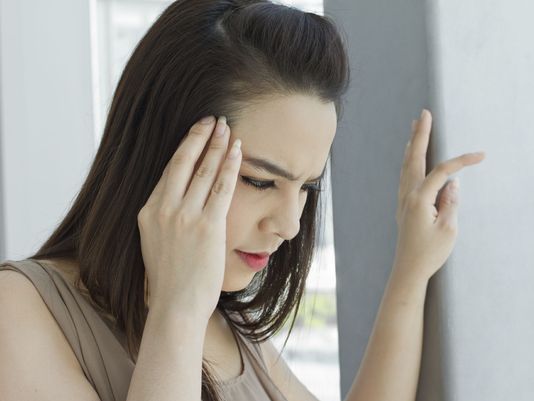Do you feel dizzy when standing up? That is probably thanks to a sudden and rapid drop in blood pressure, medically known as orthostatic hypotension. This condition is often very mild and lasts only for a few seconds after standing. It happens to everyone occasionally. But if the dizziness happens quite often or it lasts for longer than a few minutes each time, it might be a sign of a deeper problem.

Why Do I Feel Dizzy When Standing up?
There can be many causes to feeling dizzy when you stand up and some of them can be easily remedied. Others might require a trip to the doctor. Here’s what can cause it.
1. Dehydration
When you don’t have enough fluid in your body, you gradually lose blood volume. This can contribute to lower blood pressure when you stand up, which leads to dizziness. Dehydration might be caused by not drinking enough water, having diarrhea or vomiting, or strenuous exercise.
2. Heart Problems
A variety of heart problems can lead to issues with dizziness and blood pressure. An extremely low heart rate, a heart attack or impending heart failure can make you feel dizzy when standing up. The only way to be certain is to speak with your doctor about what might be going on with your heart.
3. Nervous System Disorders
Some of these disorders can make it more difficult to regulate the blood pressure. These might include Lewy body dementia, Parkinson’s disease, pure autonomic failure and more. Again, speaking with your doctor can rule these out.
4. After Eating Meals
Some people, especially older adults, might experience lower blood pressure after eating a meal. That is why you might sometimes feel dizzy when you stand up from the dinner table.
5. Age
Lower blood pressure becomes more common as we age. This is because the cells near your heart and arteries that regulate blood pressure are slowing down and in addition, your heart may have trouble beating as fast as it used to.
6. Medications
Some medications can mess with your blood pressure, including diuretics, beta blockers, alpha blockers, calcium channel blockers, nitrates, ACE inhibitors, those that are designed to treat high blood pressure and more. Some other medications can also lead to a problem with dizziness, including those that are used to treat depression, psychotic issues, erectile dysfunction and Parkinson’s disease. Muscle relaxants and narcotics may also have the same effect.
7. Pregnancy
When you are pregnant, your blood volume increases and your blood pressure might drop suddenly. It is quite normal for pregnant women to feel dizzy when standing up.
8. Other Risk Factors
If you have been on bed rest, you might become dizzy when you try to stand. If you are drinking alcohol on a regular basis, the risk of dizziness when standing up can also increase.
When to See a Doctor
If you are dealing with occasional dizziness, everything is probably fine – there is no cause for concern after the occasional dizzy spell. However, frequently feeling dizzy when standing up might mean that something is amiss. Keep a record of your symptoms. When they begin to happen with regularity, it’s time to talk to your doctor about them. Always note what time it was when the dizzy spells happened, what you were doing and how long they lasted each time.
How to Relive Dizziness When Standing up
Getting dizzy when standing up can be frightening, but there are many ways to alleviate the problem.
1. Lifestyle Changes
When you are standing up, do it very slowly. This is especially true if you are rising from a prone position, such as getting out of bed. If you are on bed rest, make sure to get as much exercise as you can by moving your arms or legs, assuming you are allowed to do so. Sleep with the head of the bed raised slightly, consider increasing your salt intake and drink plenty of fluids.
2. Medications
Some medications might help you, such as fludrocortisone which is known for helping you retain salt and water. Midodrine is another option which narrows the arteries and veins, driving your blood pressure up slightly.
3. Compression Stockings
These stockings help prevent pooling of blood in the legs when sitting or lying down, especially for long periods of time. This helps ensure that blood keeps flowing at a constant rate to your brain as you stand up.
